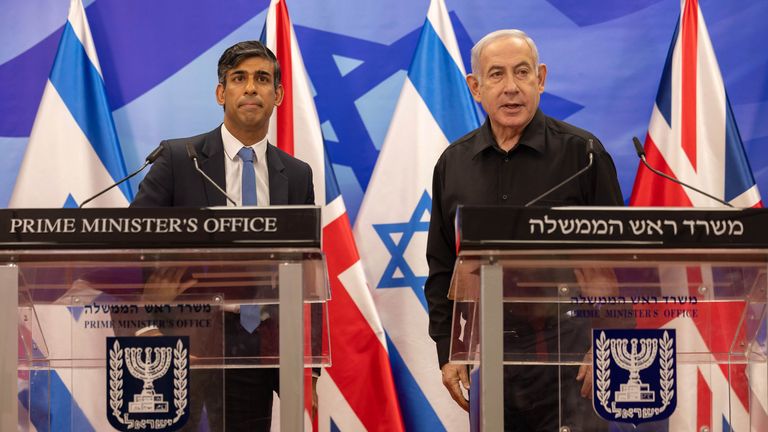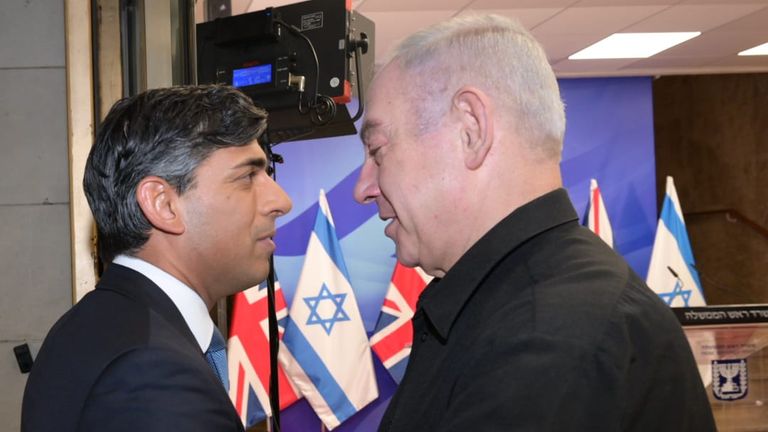The UK government is on a multi-pronged tour of the Middle East to prevent Israel’s war against Hamas from spreading across the region.
Rishi Sunak flew to Israel, then Saudi Arabia, and will make further stops, yet to be announced.
His foreign secretary, James Cleverly, was the first foreign politician to visit Israel, a week ago, and was in Cairo on Thursday before moving on to Qatar and Turkey.
But what clout do Sunak and Cleverly have to influence current tensions?
In 2021, the British government announced a “tilt” towards the Indo-Pacific, in line with the US.
Israel-Gaza latest: Israeli troops told they’ll be inside Gaza ‘soon’
At the time it made little sense for Britain to rebalance its foreign policy away from areas where it has been traditionally influential – Europe and the Middle East – towards an area many thousands of miles away.
And it turned out to be a mistake. In February 2023, Russia invaded Ukraine and all focus has been on that war. Until thirteen days ago.
In recent years, the UK has cut £90m of its budget on conflict prevention in the Middle East and north Africa and no longer has a Foreign Office minister dedicated to the region.
Read more:
Who are the British victims of the Israel-Hamas war?
Rishi Sunak says to Israel: ‘The UK stands with you’
What is the two-state solution?
Some Middle Eastern states, in particular in the Gulf region, still value the training provided by UK military, but most see Britain as having waning diplomatic influence.
Israel, especially under the current leadership of Benjamin Netanyahu, will not be swayed by anyone other than Washington.
In the West Bank, the Palestinian Authority speaks of the UK government with disdain.
It’s not without some irony that the one country in the Middle East which still regards the UK as a major player is Iran, the country which funds and arms Hamas and Hezbollah.
Britain’s historical role in the modern Middle East is significant – it helped form the current State of Israel and has played central roles in more recent conflicts in Iraq, Yemen and Libya.
As a permanent member of the UN Security Council, it was part of the negotiating team for the Iran nuclear deal, but that has since collapsed and a new agreement doesn’t seem likely soon.
Downing Street, meanwhile, has been engaged elsewhere.
Gulf states have grown rich beyond belief off the back of oil reserves, and their confidence to spread influence has increased accordingly.
Britain, by comparison, has cut its aid budget, withdrawn from the EU, and shown only scant interest in the region.
The concept of “Global Britain”, while the country was struggling to rebuild its international relations after Brexit, resulted in the UK spreading itself thin.
As a result, key regions were neglected and historical relationships taken for granted.
The Middle East is a region where money and power talks – China has recognised that and its influence has grown as a result.
The US might have a mixed reputation, and is disliked by many after the devastating war in Iraq, but its military bases and financial assistance to governments across the region maintained its clout.
Click to subscribe to the Sky News Daily wherever you get your podcasts
Rishi Sunak, as British prime minister, is not without influence, but he has few levers to pull as he tours the Middle East in an attempt to stop the Israel-Gaza war spreading.
As Britain has prioritised other interests, many in the Middle East have also cultivated other allies.
Old friends have been alienated, and no new friends have been made.
The danger of allying with Israel, without equivocation, will alienate many in the Arab world.
The Middle East goes through periods of calm, but as Sunak might learn in the coming days, you neglect it at your peril.












![Business tycoon in Novrongo to bury late father in a car [Video]](https://ghananewss.com/storage/2023/05/business-tycoon-100x75.jpeg)







